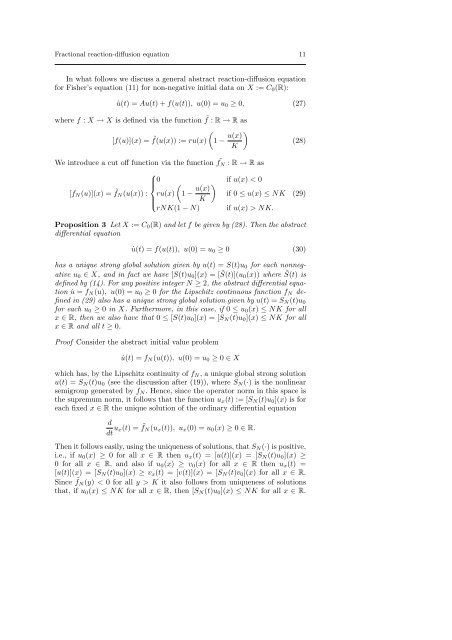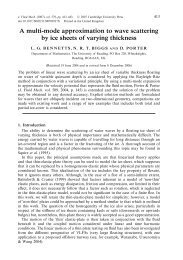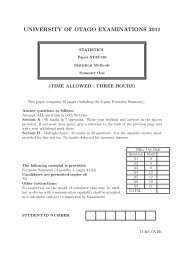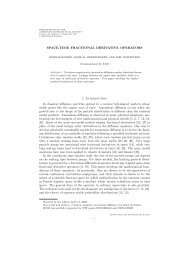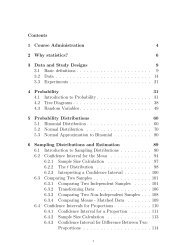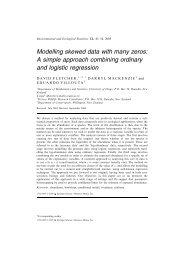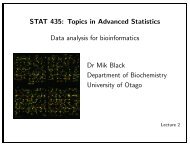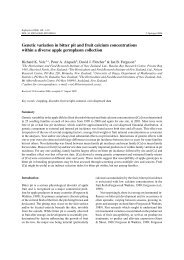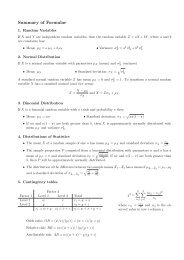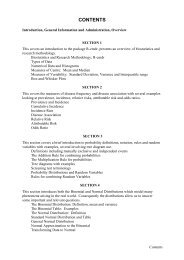Fractional reaction-diffusion equation for species ... - ResearchGate
Fractional reaction-diffusion equation for species ... - ResearchGate
Fractional reaction-diffusion equation for species ... - ResearchGate
Create successful ePaper yourself
Turn your PDF publications into a flip-book with our unique Google optimized e-Paper software.
<strong>Fractional</strong> <strong>reaction</strong>-<strong>diffusion</strong> <strong>equation</strong> 11<br />
In what follows we discuss a general abstract <strong>reaction</strong>-<strong>diffusion</strong> <strong>equation</strong><br />
<strong>for</strong> Fisher’s <strong>equation</strong> (11) <strong>for</strong> non-negative initial data on X := C 0 (R):<br />
˙u(t) = Au(t) + f(u(t)), u(0) = u 0 ≥ 0, (27)<br />
where f : X → X is defined via the function ˜f : R → R as<br />
(<br />
[f(u)](x) = ˜f(u(x)) := ru(x) 1 − u(x) )<br />
K<br />
We introduce a cut off function via the function f ˜ N : R → R as<br />
⎧<br />
0<br />
⎪⎨ (<br />
if u(x) < 0<br />
[f N (u)](x) = ˜f N (u(x)) : ru(x) 1 − u(x) )<br />
if 0 ≤ u(x) ≤ NK<br />
K<br />
⎪⎩<br />
rNK(1 − N) if u(x) > NK.<br />
(28)<br />
(29)<br />
Proposition 3 Let X := C 0 (R) and let f be given by (28). Then the abstract<br />
differential <strong>equation</strong><br />
˙u(t) = f(u(t)), u(0) = u 0 ≥ 0 (30)<br />
has a unique strong global solution given by u(t) = S(t)u 0 <strong>for</strong> each nonnegative<br />
u 0 ∈ X, and in fact we have [S(t)u 0 ](x) = [ ˜S(t)](u 0 (x)) where ˜S(t) is<br />
defined by (14). For any positive integer N ≥ 2, the abstract differential <strong>equation</strong><br />
˙u = f N (u), u(0) = u 0 ≥ 0 <strong>for</strong> the Lipschitz continuous function f N defined<br />
in (29) also has a unique strong global solution given by u(t) = S N (t)u 0<br />
<strong>for</strong> each u 0 ≥ 0 in X. Furthermore, in this case, if 0 ≤ u 0 (x) ≤ NK <strong>for</strong> all<br />
x ∈ R, then we also have that 0 ≤ [S(t)u 0 ](x) = [S N (t)u 0 ](x) ≤ NK <strong>for</strong> all<br />
x ∈ R and all t ≥ 0.<br />
Proof Consider the abstract initial value problem<br />
˙u(t) = f N (u(t)), u(0) = u 0 ≥ 0 ∈ X<br />
which has, by the Lipschitz continuity of f N , a unique global strong solution<br />
u(t) = S N (t)u 0 (see the discussion after (19)), where S N (·) is the nonlinear<br />
semigroup generated by f N . Hence, since the operator norm in this space is<br />
the supremum norm, it follows that the function u x (t) := [S N (t)u 0 ](x) is <strong>for</strong><br />
each fixed x ∈ R the unique solution of the ordinary differential <strong>equation</strong><br />
d<br />
dt u x(t) = ˜f N (u x (t)), u x (0) = u 0 (x) ≥ 0 ∈ R.<br />
Then it follows easily, using the uniqueness of solutions, that S N (·) is positive,<br />
i.e., if u 0 (x) ≥ 0 <strong>for</strong> all x ∈ R then u x (t) = [u(t)](x) = [S N (t)u 0 ](x) ≥<br />
0 <strong>for</strong> all x ∈ R, and also if u 0 (x) ≥ v 0 (x) <strong>for</strong> all x ∈ R then u x (t) =<br />
[u(t)](x) = [S N (t)u 0 ](x) ≥ v x (t) = [v(t)](x) = [S N (t)v 0 ](x) <strong>for</strong> all x ∈ R.<br />
Since ˜f N (y) < 0 <strong>for</strong> all y > K it also follows from uniqueness of solutions<br />
that, if u 0 (x) ≤ NK <strong>for</strong> all x ∈ R, then [S N (t)u 0 ](x) ≤ NK <strong>for</strong> all x ∈ R.


